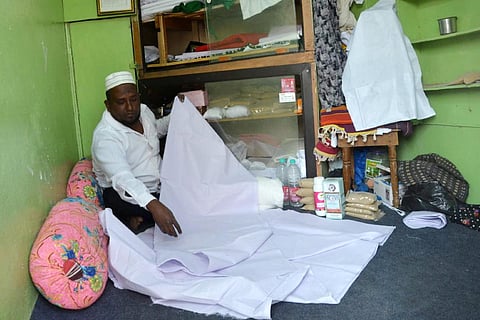

The lanes of Hyderabad’s Old City with its Irani hotels, function halls, schools, apartment buildings, and various enterprises exude a rundown yet dynamic vigour found only in the older, rustic parts of a major metro. It is here that death too rears its head – the kafan (shroud) shops in these areas are morbid reminders of mortality. Not only do the shops sell the garment in which many Muslims are wrapped prior to burial, the shop owners also wash dead bodies as per Islamic law before burial.
While these small business owners provide an essential service to bereaved family members, society unfortunately looks at them disdainfully. There is an undue stigma attached to their profession, added to the fact that people venture to their shops in the most tragic of circumstances. Osman Bin Ali Kaseeri , the owner of the Branch Barkas Kafan Shop in the Dabeerpura Darwaza area, tells TNM, “Ninety-nine percent of people we meet outside of our outlet look down upon our profession. But when a death happens and the family is going through a taxing period during which they haven’t come to terms with the loss of the loved one and have to simultaneously undertake the final rites, all of a sudden we are sought after like a necessary evil.”
Customers may display politeness, but not respect, towards those to whom they outsource the preparation of cleaning and clothing their departed loved ones. But for Kaseeri and his co-owners, theirs is not just another small Old City shop, but a means of serving mankind. Likewise, Abdul Rehman Bin Khalid couldn’t be prouder of carrying on the familial tradition of providing an important service for bereaved individuals, be it giving ghusl (a bath), providing the shroud, or wrapping the corpse in it. Yet their satisfaction is marred by the lack of social acceptance.
Their very profession poses a hindrance, for instance, when they want to get their children married. Moulim Rafeeq Bin Al-Kaseeri, who runs the Anjuman Faiz-ul-Muslimeen Kafan Shop in Engine Bowli, reveals, “Whenever I meet with families for prospective matches for my children, the second they find out about my line of work they either leave right away or don’t take the alliance forward.”
The shops sell two types of shrouds – costing Rs 4,500 and Rs 3,500 each. On average, four to five shrouds per month are sold. However, during the COVID-19 pandemic, they sold the same number every day in certain phases of the first and second waves. With that came a change in many people’s attitudes, as COVID proved to be the great leveller, the owners say. The most strenuous of circumstances brought people who would otherwise steer clear of these kafan shop owners to their homes.
Recalling the demanding days, Abdul Rehman says, “People approached us at the oddest hours, not just at our workplace but our homes too. A lot of funerals took place at midnight as well. This made it dreary and harrowing for us too.”
During COVID, many grieving families generously provided help. Sometimes the kin of the departed would offer them whatever money the deceased family member had in their pockets.
That said, with things returning to status quo, so has the mindset of people towards them, according to the owners.
Fortitude is a major prerequisite for handling dead bodies, the kafan merchants stress. Be it a body with a disfigured face, or partially or fully mutilated limbs, they cannot afford to be squeamish in their line of work. Anyone who feels queasy about handling dead bodies would not be able to perform rituals like applying red powder on the body or kohl on the eyelids of the corpse.
Osman adds, “One has to be able to brave the bad odour, and not just sit beside the corpse but lift it and put it down.”
Despite being satisfied with the bare minimum sustenance, there remains a question mark with regard to succession.
Rafeeq and Osman are ready to offer training to youngsters, be it their own children or others. The latter laments, “For the past 60 years, service to mankind and to God has been our motto. But youth today are reluctant to come forward to learn the burial rituals and related logistics.”
Like many youngsters, their children too have opted for 9-5 professions. There may be a ray of hope with Abdul Rehman’s 30-year-old cousin helping him run the store.
Wajeed Ullah Khan is a Hyderabad-based freelance journalist who writes predominantly on issues surrounding Old City. Daneesh Majid is a Hyderabad-based writer and researcher on South Asian culture and security.